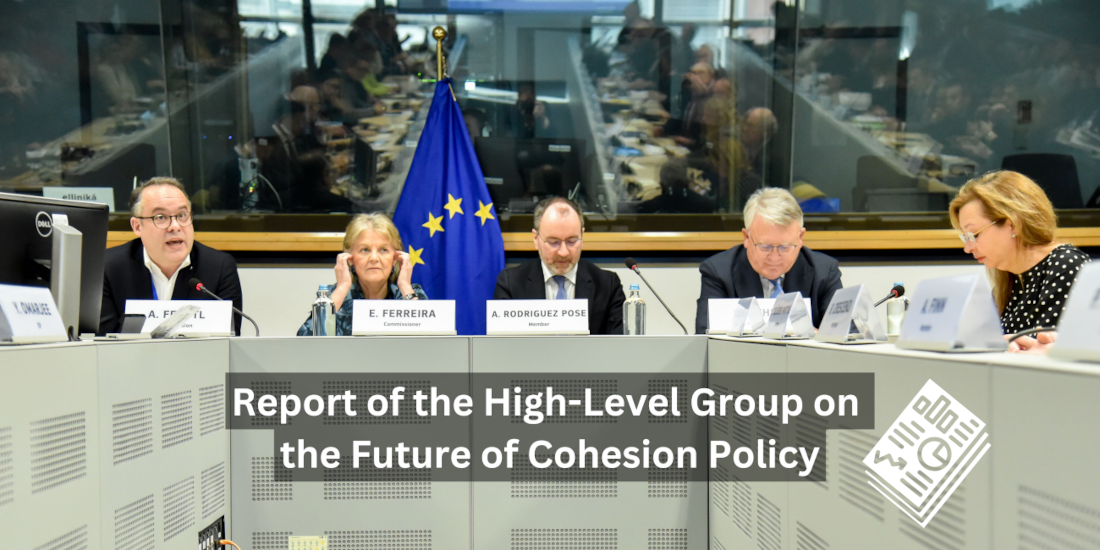Panorama
High-Level Group Report Sets Blueprint for Future of EU Cohesion Policy
- 28 Feb 2024
On the 20 of February, the High-Level Group on the Future of Cohesion policy Report unveiled its final report containing strategies to address future challenges and adapting the Cohesion policy to ever-changing circumstances.
In an event held in Brussels on the 20 February 2024, the High-Level Group on the Future of Cohesion Policy presented its final report to a room packed with stakeholders, Cohesion policy practitioners and journalists. The High-level group was minted in 2023, upon Commissioner Elisa Ferreira’s initiative, with the mandate of charting a course for the Future of Cohesion policy.
Setting the Stage for Future Cohesion Policy
The Group, constituted of independent experts, included practitioners from many different backgrounds, ranging from academia, politics, socio-economic spheres, and civil society. The presentation of the report comes at the end of a year-long work, spanning 10 meetings web streamed for the benefit of interested parties. The group was tasked with assessing the challenges identified in the 8th Cohesion Report and reflecting on how to maximize the effectiveness of Cohesion policy. At its core, the exercise was about dissecting European cohesion and estimating whether the now 30-year-old policy was still up to the task of tackling challenges such as the innovation divide, the demographic change, the digital and green transition, and the risks associated with environmental crisis.
Remembering the historical role of Cohesion policy in European integration, Commissioner Ferreira’s opening address reflected the monumental achievements of the past. But Cohesion policy remains crucial in an era marked by global competition and the imperative to achieve carbon neutrality. The Commissioner went on to stress the proven capacity of Cohesion Policy in adapting to changing circumstances and reacting to external shocks, from the post-2008 financial crisis to the more recent pandemic or Russian invasion of Ukraine.
Moreover, Commissioner Ferreira reminded the audience of the objective of convergence saying that “the European project will not fully succeed if some places are left on the sidelines.” highlighting the role of the High-level group in drawing a blueprint for an ever more robust, inclusive and prosper EU.
Key Insights and Recommendations
Commissioner for Jobs and Social Rights, Nicolas Schmit echoed this sentiment, elucidating the enduring importance of solidarity and equitable distribution of resources. He emphasized the need for Cohesion Policy to remain a cornerstone of EU initiatives, particularly in light of evolving challenges and the imperative of fostering competitiveness and innovation across all regions. "Cohesion is a win-win," he declared, emphasising the interconnectedness of Europe's prosperity.
Moreover, Commissioner Schmit highlighted the policy's pivotal role in addressing not just economic disparities but also security concerns, underlining the intrinsic link between cohesion and stability.
Following the two Commissioners’ remarks, the Chair of the High-level group – and friend of this publication -, Professor Andrés Rodriguez-Pose, introduced the findings of the report.
In summarising the work of the Group, Rodriguez-Pose had to lead with the multifaceted dimension of Cohesion Policy. He underscored the imperative of leveraging Europe's diverse assets and addressing structural inequalities to unlock untapped economic potential.
The report, structured around a set of fundamental questions that investigate what Cohesion policy is, before examining what it should be in the future. This was necessary, Rodriguez-Pose explained, to unpack the evolving challenges facing Cohesion Policy and trace a comprehensive framework for future action.
In fact, the report identifies critical areas such as competitiveness, polarization, lack of opportunities, and turbulent global dynamics, underscoring the imperative of tailored interventions to address these complex issues.
As Europe navigates a rapidly changing global landscape, characterized by technological disruptions, demographic shifts, and environmental imperatives, the High-Level Group's report stresses the need for a future policy that continues to be place-based as much as people-based.
Introducing the work of the group, Rodriguez-Pose underscored how still today 120 million EU citizens regrettably live in less developed region. To this he added that 60 million of these people live in regions with a GDP per capita lower than it was in 2000 while 75 million hail from regions with near-zero growth.
According to this evidence, one third of the EU population lives in places that have slowly fallen behind. He proceeded to expose the difficulty that these regions experience in pulling themselves out of these development traps, in contrast to other parts of the world. Such levels of stagnation in regions where people already feel forgotten are a breeding ground for discontent and polarisation. Confirming Commissioner’s Schmitt insights on security and stability, Rodriguez-Pose warned against the political risk of such levels of disenfranchisement, which lead to a loss of faith in the European project.
Collaborative Efforts for Inclusive Policy Making
For this reason, Rodriguez-Pose explained, Cohesion Policy should remain fundamentally concerned with its original mission of driving sustainable development and boosting competitiveness, while maintaining flexibility to address urgent challenges.
Nonetheless, “Cohesion is far too important to be left to Cohesion Policy alone”, he quipped, adding that there is no cohesion if the benefits of other policies are concentrated in a few places. On the other hand, there can be no green transition, nor a functioning Single Market, nor a more innovative or competitive EU without cohesion.
The diverse composition of the High-level group, which included representative of civil society, was instrumental in reminding the importance of listening to the needs of the people that will benefit or will be affected by policymaking. The Chair of the Group was adamant in underlining the importance of civil society involvement in the decision-making process.
In conclusion, the comprehensive insights provided by the final report of the High-Level Group on the Future of Cohesion Policy are poised to serve as a contribution for policymakers across the European Union to navigate the complexities of regional development, economic convergence, and social cohesion.

